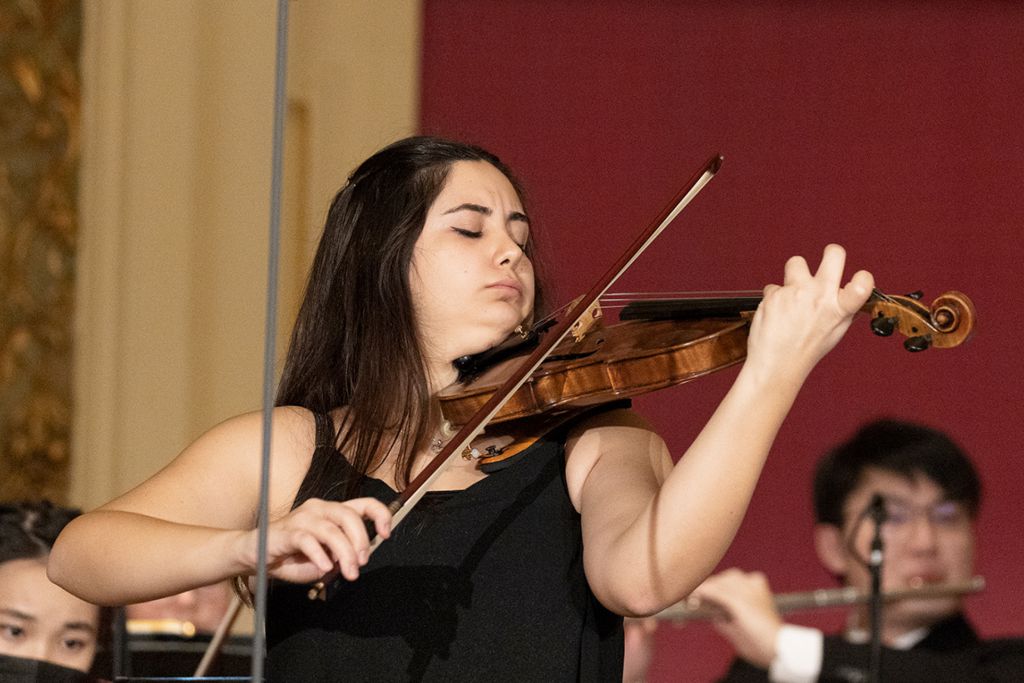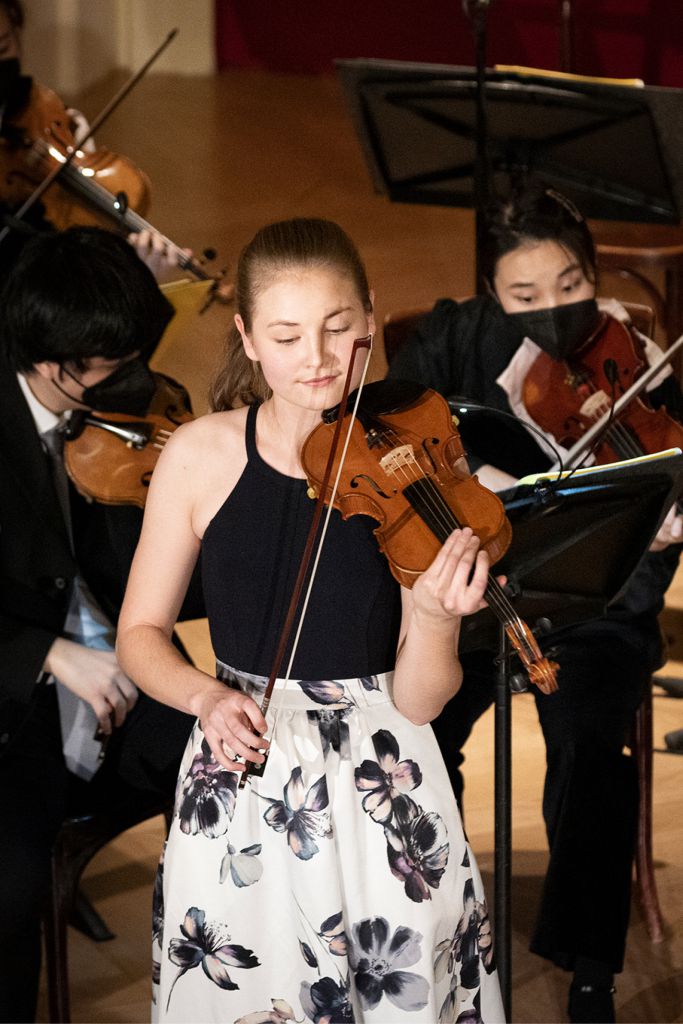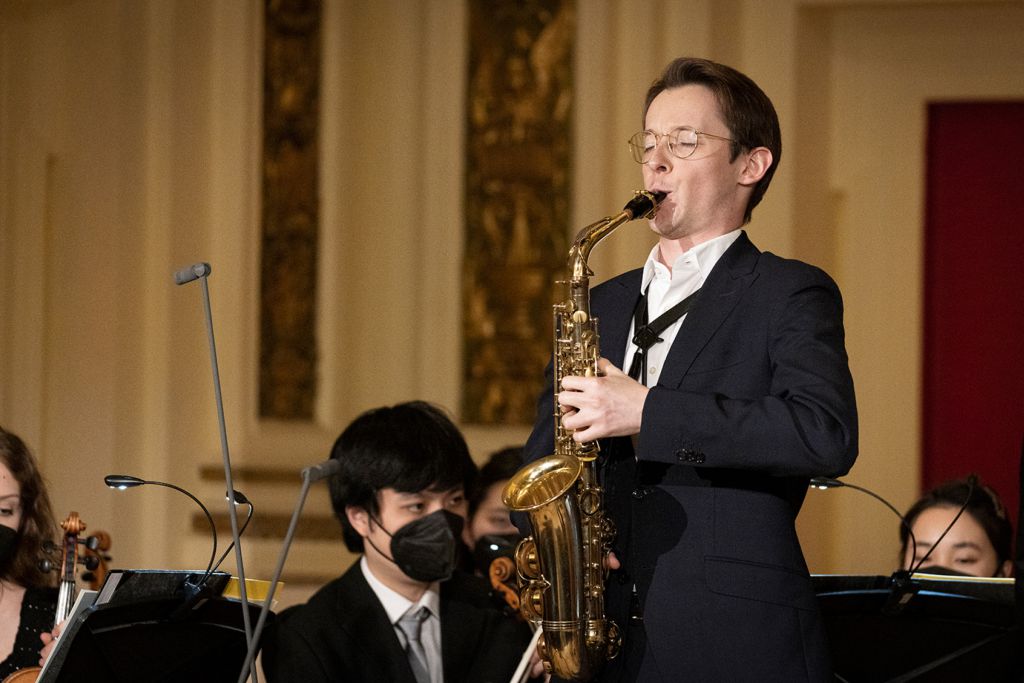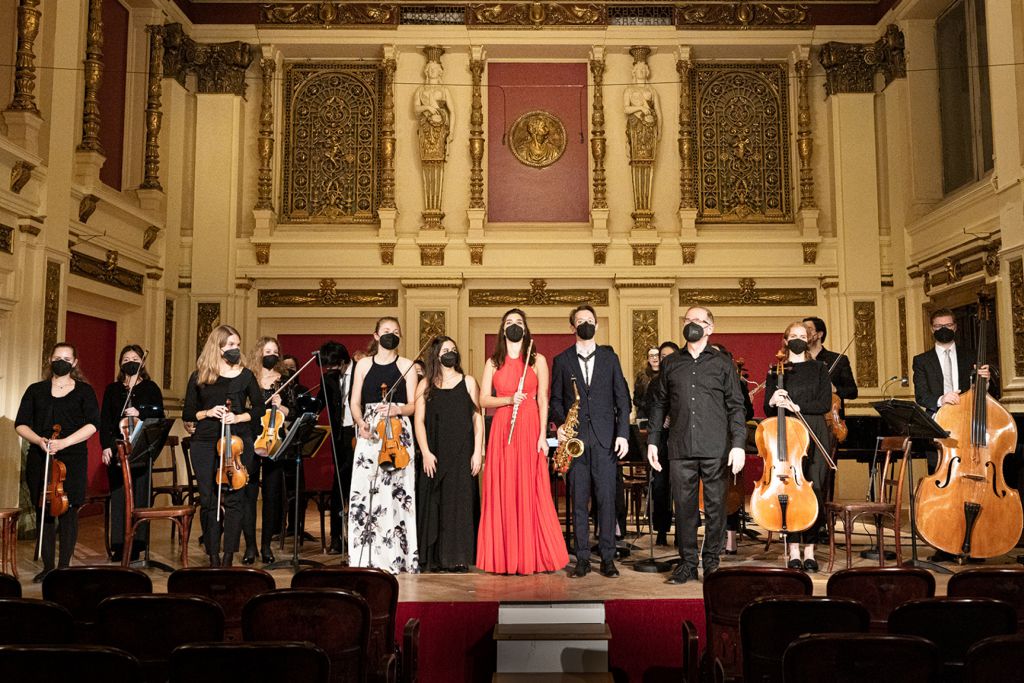The ongoing cooperative activities involving the Fritz Kreisler Department of String Instruments, Harp and Guitar (FKI) and the Leonard Bernstein Department of Wind and Percussion Instruments (LBI) are now advancing to an entirely new level.
Be it in orchestral playing, chamber music ensembles, or as soloists, and be it with winds, percussion, harp, guitar, or bowed instruments: these two departments are interconnected in myriad ways. They share a common curriculum and numerous common musical works, and they collaborate in orchestral settings as well as on questions and themes associated with music history, understanding music, performance coaching, self-management, audition training, and a practically endless list of other things. Moreover, students who play different instruments also learn from one another—like when string players observe how their wind-playing colleagues breathe.
Many such commonalities have long been providing a basis for intense and positive interdepartmental collaboration. This is reflected not least by the number of faculty members who provide instruction to students of both departments. And for nearly one year, the two departments have also shared an artistic management office headed by Laura Eichenseer that provides organisational support for both departments’ concerts and projects.

The first highlight to emerge from this cooperation was the concert “4 Solo and Orchestra” in the Ehrbarsaal on 6 December 2021.
This past St. Nicholas Day saw the Ehrbar-Saal abuzz with joyful expectation, with around 30 students of the mdw’s Fritz Kreisler and Leonard Bernstein Departments about to perform under the baton of Vladimir Kiradjiev. Every note they subsequently played bore within it this message: how wonderful it is to be able to make music together!
The programmed works included Viennese classical violin concertos, a flute concerto by Rodrigo, and a saxophone concerto by Ibert. The four young soloists had already been nominated by specialist juries in May 2021 as part of the institutions’ respective internal competitions, each of which had seen approximately 60 students compete in two rounds.

The project orchestra, put together specifically for this celebratory concert, provided the participating students with an important opportunity to gain experience in orchestral playing and the accompaniment of soloists. With the pandemic still ongoing, whether the event would be able to take place at all remained an open question right up to the last minute. But uncertainty aside, this concert did indeed represent an important element in the training of these students. Angelika Dorfer of the Orchestra Office as well as Laura Eichenseer took comprehensive care of all safety measures and their strict observance.
This concert was filmed by cameras positioned on raised platforms and amidst the orchestra, for the lockdown that had been imposed Austria-wide meant that the audience had to watch at home.
While the participating musicians missed having an audience present, they were conscious of how their loved ones both from Vienna and far afield were able to watch live. The musicians all enjoyed the Ehrbar-Saal’s wonderful acoustics and aesthetics as well as playing together with their colleagues and friends in the orchestra.

The first soloist, Doğa Altinok, wrote in the programme booklet that she’d been unable to fall asleep as a small child without first having listened to music by Mozart. And indeed, the full intensity of her love for this music could be clearly heard in her intimate and successful performance of Mozart’s Adagio in E Major and his Rondo in C Major. She was extremely happy to have been chosen as a soloist for this concert, since she’d had almost no opportunities to perform in concert during the several months prior.
Flutist Nicole Henter, from Budapest, presented a very rarely played concerto by Joaquín Rodrigo with wonderful tone and abundant energy. In her performance, Henter displayed brilliant technique and managed to render this work’s complex rhythms exquisitely transparent with her outstanding articulation. Since being able to rehearse and play publicly with an orchestra is not an everyday thing, at least not for a student, Henter enjoyed doing so all the more. But she, too, missed having a live audience and the atmosphere that it would have created. Precisely this situation made her even more aware of how great a privilege it is to be able to play a concert with an audience present.

In her choice of a concerto by Haydn, Katharina Auer—the second violin soloist—featured a work that is performed quite rarely compared with the Mozart concertos. Auer commented, “The Haydn concerto is unbelievably great! It really has everything: it’s sprightly and lively, it swings, and the second movement is just wonderful. Haydn’s music is infused with a lot of feeling, but it’s a different kind of emotionality than in romantic music.” The fact that Katharina Auer stands behind these words 100 percent becomes evident when one hears her play: it’s music-making that’s full of intimacy and liveliness.
Martín Castro Tubio, who began his studies in Spain, has only been at the mdw for just over a year. This was his first time onstage with an orchestra as a soloist, an unforgettable experience that provided him with all the more motivation for his activities in the future. The Concertino da Camera for Alto Saxophone and Orchestra is one of the most important works in the classical saxophone repertoire, and Martin stood out for his wonderful tone, outstanding technique, impressive cadenzas, and impassioned playing. The plan had been for his family to make a special trip from Spain to attend the concert, which unfortunately didn’t come to pass. But thanks to the fact that his performance was streamed live, Martín didn’t feel alone—and, most importantly, he did sense how the music he made together with the orchestra was going out into the world.

The concert “4 Solo and Orchestra” provided a successful kick-off and an initial highlight in what is to be a variety-packed series of interdepartmental concerts, and there will be more such joint performances by the best students of both departments in the future. The concert gezupft, gestrichen, geblasen und geschlagen [Bowed, Blown, Plucked, Struck], originally planned for 15 January 2021, is now set to take place on 26 March 2022. And a further highlight of this interdepartmental cooperation will be the second edition of the festive large-scale event Best of Institut 5 & 6 [Best of Departments 5 and 6], which serves as the internal departmental competitions’ joint prizewinners’ concert and will hopefully be open to the public once more in addition to being streamed live.

